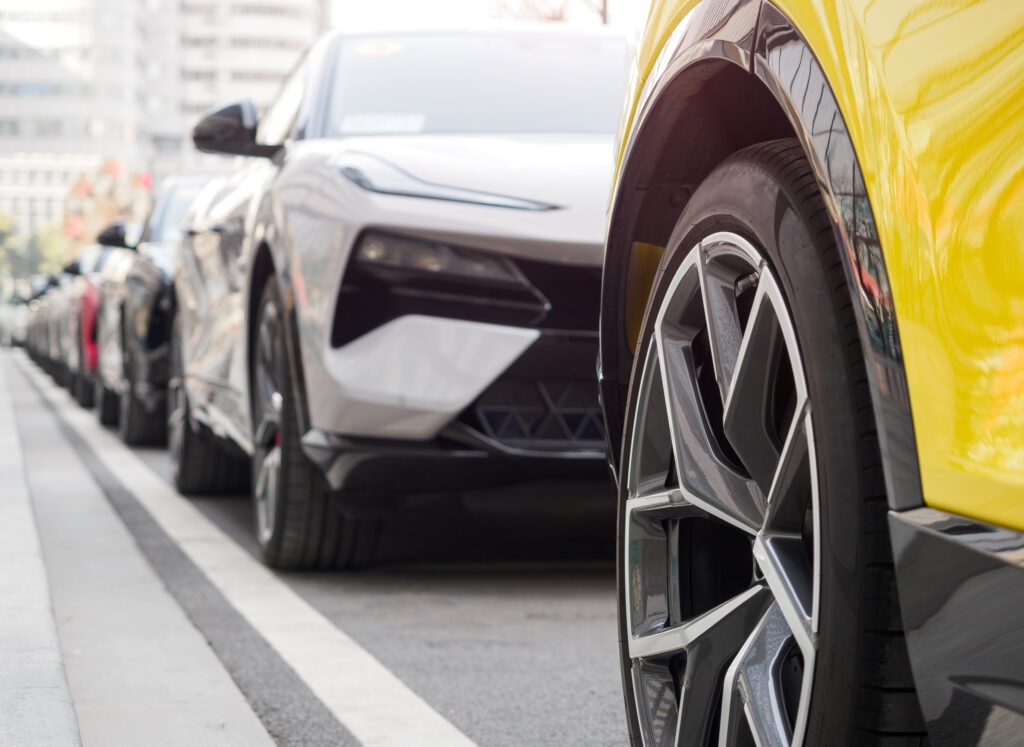BEVs made up a quarter of the Chinese new-car market in September
27 November 2023

Electric vehicles (EVs) made up 37% of China’s new-car market in September. José Pontes, data director at EV-volumes.com reviews the popularity of the plug-in powertrains.
Comprising battery-electric vehicles (BEVs) and plug-in hybrids (PHEVs), EVs hit more than 776,000 sales in China in September, up 22% year on year. This is the market’s second record month in a row.
Plug-in vehicles represented 37% of the entire new-car market, with BEVs alone accounting for 25%. This put the 2023 EV share at 36%, with BEVs accounting for 24% alone. Considering the current trajectory, China’s plug-in vehicle market can be expected to take a 40% share by the end of 2023.
BYD’s victory song
The BYD Song led the way again in China, scoring 62,840 registrations in September. Over 10,000 of these were BEVs, which is the first time the all-electric version crossed into five-digit territory. The Song is likely to be China’s best-selling model for 2023.
Looking at the internal competition, the BYD Frigate 07 PHEV has failed to make a dent in the midsize SUV’s sales. The same is true of the BYD Denza N7, which could be a result of it not offering a PHEV version. The upcoming Song L could pose an internal threat, but this is only likely to affect next year’s sales.
The BYD Qin Plus came second in the month, with 43,002 registrations, 11,837 of which belonged to the BEV version. With prices starting at ¥100,000 (€12,884), demand is strong. This is despite fierce internal competition from the Seal and the Destroyer 05.
BYD’s lower-priced midsize sedan can be expected to keep posting strong results at the cost of its more expensive siblings. It should have no problem keeping its direct competitors at a safe distance, with the likely exception of the refreshed Tesla Model 3 in November and December.
The Tesla Model Y recorded 41,428 registrations in September, down around 10,000 units on the previous month. It is possible that Tesla has changed from its regular end-of-quarter allocation policy, with the strongest month in China now taking place in the middle of the quarter.
The Model Y has kept up with the exceptional performances of the local brands. The BEV’s most immediate threat comes from inside Tesla’s own stable in the form of the refreshed Model 3. While the sedan has not been as disruptive as some expected, the new interior and updated specs could allow it to start taking volume from its crossover sibling in the coming months.
With 35,011 registrations, the BYD Seagull kept ramping up deliveries. While performing well locally, the EV could prove truly disruptive overseas. An affordable plug-in vehicle has been long awaited in Latin America and Africa. Europe would also benefit from a quality value-for-money model.
The BYD Yuan Plus posted 28,727 registrations in September, surpassing its Dolphin sibling and returning to the top five. With the compact EV focused on export markets, it appears the carmaker is happy to have the model returning around 30,000 registrations a month domestically. This should mean the Yuan Plus will hold a regular spot in China’s EV market.
Li Auto’s triumphant trio
In sixth, the GAC Aion Y hit 26,969 sales, making for a new record performance. Further down the table, Li Auto placed all three of its full-size SUVs in the top 20. The L9 managed another record month with 11,844 registrations in 14th.
Li Auto is targeting 400,000 unit sales this year, 800,000 in 2024 and 1.6 million units in 2025. This will make the upcoming L6 a very important model for the brand. The carmaker also expects to place 3,000 superchargers in China by 2025, capable of 480kW.
Changan’s midsize SUV joined the table in 17th with a best-ever monthly total of 10,244 registrations. Geely’s Galaxy L7 sedan took 20th place, making it the carmaker’s second model in the top 20. This meant Geely was one of the six brands putting more than one model in September’s chart.
Outside the top 20, XPeng’s G6 managed 8,132 registrations in its third month on the market. The new model should join the top 20 soon as its production ramp-up continues. Nio’s ES6 sold well (7,896 registrations), as did Leapmotor’s C11 with 9,071 registrations. BYD celebrated the landing of the Seal PHEV with a 7,444-unit performance.
Changan’s new premium sub-brand, Deepal, saw its SL03 achieve a positive performance with 7,126 registrations. Chery’s QQ Ice Cream reached 7,235 registrations, its best result in a year. Meanwhile, the Zeekr 001 scored 8,701 registrations, a new best in 2023 for Geely’s premium model.
The Volkswagen (VW) ID.3 recorded 9,650 registrations, a new record for the German hatchback in the region. The same can be said for the ID.4 which saw sales climb to 6,938 units, a new best. Both results confirm the effectiveness of pricing adjustments.
Tesla disrupts top five
Between January and September, the BYD Song has managed to stay well ahead of its competition. In second, the BYD Qin Plus kept the Tesla Model Y at bay in third. In fourth, the BYD Dolphin was followed closely by the Yuan Plus, roughly 2,000 units behind.
The seventh-place Wuling Mini EV and the eighth-place BYD Han had the ninth-place GAC Aion Y pull in close behind them. Another model on the rise is the BYD Seagull, climbing one position in September to 10th. It can be expected to jump a few more positions by the end of 2023. In 14th, the Wuling Bingo closed in on the Changan Lumin in 13th, meaning a change between the two models may occur in the coming months.
Elsewhere, all three Li Auto models made it into the top 20. The largest of them, the L9, managed to climb one position, to 18th. Apart from BYD, no other brand has placed so many models in the top 20. In just four years, Li Auto has gone from making no deliveries to 500,000.
Diverse Chinese market
September saw BYD stay stable in its leadership position with a 35% share of the EV market, looking to win its 10th plug-in title this year. Meanwhile, Tesla (8.1%, down from 8.4% in August) was stable in second place.
Third-place GAC Aion held firm at 6.6%, while the SGMW joint venture saw its share drop from 5.6% in August to 5.4%. Fifth-place Li Auto kept a grip on its 4.5% share of the market. The major brands have lost share to those below the top five, highlighting the diversity of the Chinese market. In sixth, Changan (4.2%) is looking to return to the best-sellers table.
Grouping brands by OEM, BYD was comfortably in the lead with a 36.7% share of the market. Meanwhile, Tesla (8.1%) held firm in second ahead of third-place SAIC and fourth-place GAC. While SAIC saw its share fall to 7.1% from 7.2% in August due to another slow month, GAC (7.1%) continued its slow rise.
In fifth, Geely–Volvo also recorded slow growth, taking a 5.9% share. Just below, sixth-place Changan (4.6%) gained some precious ground over Li Auto (4.5%) in seventh. However, the distance between the two is small, so a position change could soon take place.



